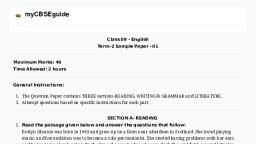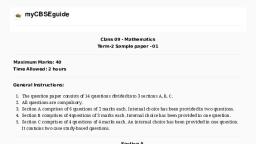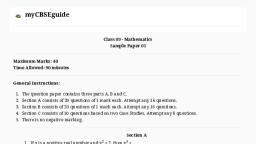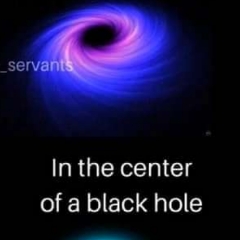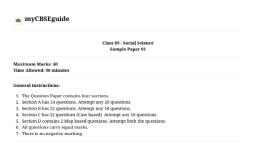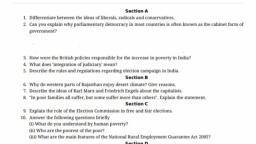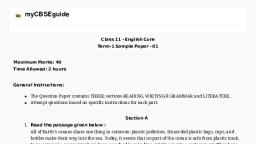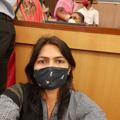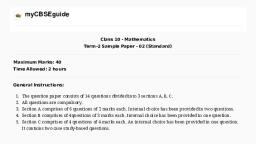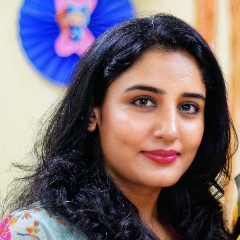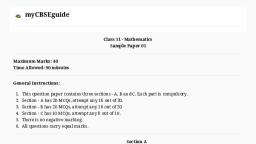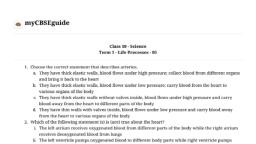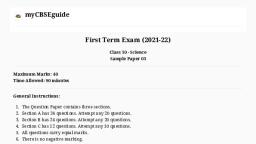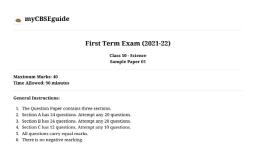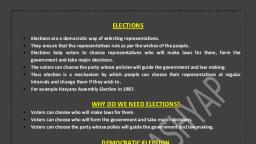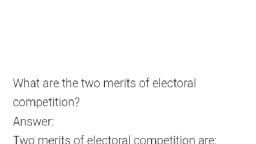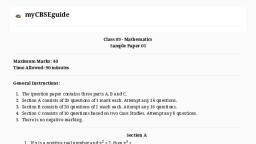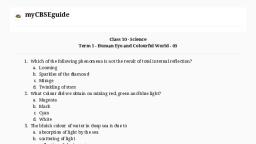Page 1 :
myCBSEguide, , Class 09 - Social Science, Term-2 Sample Paper - 01, , Maximum Marks: 40, Time Allowed: 2 hours, , General Instructions:, i. This Question paper is divided into five sections-Section A, B, C, D and E., ii. All questions are compulsory., iii. Section-A: Question no. 1 to 5 are very short answer type questions of 2 marks each. The answer to each, question should not exceed 40 words., iv. Section-B: Question no. 6 to 8 are short answer type questions, carrying 3 marks each. The answer to each, question should not exceed 80 words., v. Section-C: Question no. 9 and 10 are long answer-type questions, carrying 5 marks each. The answer to each, question should not exceed 120 words., vi. Section-D: Question no. 11 and 12 are Case-Based questions., vii. Section-E: Question no. 13 is map-based, carrying 3 marks., viii. There is no overall choice in the question paper. However, an internal choice has been provided in a few, questions. Only one of the choices in such questions has to be attempted., ix. In addition to this, separate instructions are given with each section and question, wherever necessary., Section A, 1. Differentiate between the ideas of liberals, radicals and conservatives., 2. Can you explain why parliamentary democracy in most countries is often known as the cabinet form of, government?, To practice more questions & prepare well for exams, download myCBSEguide App. It provides, complete study material for CBSE, NCERT, JEE (main), NEET-UG and NDA exams. Teachers can, use Examin8 App to create similar papers with their own name and logo., 3. How were the British policies responsible for the increase in poverty in India?, 4. What does 'integration of judiciary' mean?, 5. Describe the rules and regulations regarding election campaign in India., Section B, 6. Why do western parts of Rajasthan enjoy desert climate? Give reasons., 7. Describe the ideas of Karl Marx and Friedrich Engels about the capitalists., 8. "In poor families all suffer, but some suffer more than others". Explain the statement., Section C, 9. Explain the role of the Election Commission in free and fair elections., 10. Answer the following questions briefly, (i) What do you understand by human poverty?, (ii) Who are the poorest of the poor?, (iii) What are the main features of the National Rural Employment Guarantee Act 2005?, Section D, 11. Read the given text and answer the following questions:, , Copyright © myCBSEguide.com. Mass distribution in any mode is strictly prohibited., , 1/6
Page 2 :
myCBSEguide, The defeat of Imperial Germany and the abdication of the emperor gave an opportunity to, parliamentary parties to recast German polity. A National Assembly met at Weimar and established a, democratic constitution with a federal structure. Deputies were now elected to the German Parliament, on the basis of equal and universal votes cast by all adults including women. This republic, however,, was not received well by its own people largely because of the terms it was forced to accept after, Germany’s defeat at the end of the First World War., i. What is the German Parliament called?, ii. Why was the peace treaty ‘humiliating’ for Germany?, iii. Why was the Weimar Republic not received well by its own people?, 12. Read the given text and answer the following questions:, India is a large country with diverse landscapes with extremes on the land limits. India lies in the, southern hemisphere with surrounded by almost three sides. In the north of India, it has one of the, mightiest mountain ranges, The Himalayas. On the other hand, India has a long coastline ranging up to, 7000km. This diversity in landforms is also blessed with a diversity of flora and fauna in India., i. What type of vegetation is found in the southern slopes of the Himalayas?, ii. What factors are responsible for the diversity of flora and fauna in India?, iii. Classify the types of animals found in the Himalayan range., To practice more questions & prepare well for exams, download myCBSEguide App. It provides, complete study material for CBSE, NCERT, JEE (main), NEET-UG and NDA exams. Teachers can, use Examin8 App to create similar papers with their own name and logo., Section E, 13., , I. On the given outline Political Map of World, identify the place marked as A with the help of the, following information and write its correct name on the line marked near it., (A) One of the major countries of the Allied Powers., , II. On a separate outline Map of India, show the following:, i. Identify the shaded area which is the vegetation of high altitude., OR, Label the river forms that the largest river basin., ii. Locate a Saltwater Lake in western India., , Copyright © myCBSEguide.com. Mass distribution in any mode is strictly prohibited., , 2/6
Page 3 :
myCBSEguide, , Copyright © myCBSEguide.com. Mass distribution in any mode is strictly prohibited., , 3/6
Page 4 :
myCBSEguide, Class 09 - Social Science, Term-2 Sample Paper - 01, , Solution, Section A, 1. (i) Liberals :, They believed in changing the society. They wanted a nation which tolerated all religions. They, wanted to safeguard the rights of individuals against government. However, they thought that only, propertied men should have the right to vote. They also did not want women to vote., (ii) Radicals:, In contrast, they believed in the rule of majority of the country’s population. They opposed the, privileges of the landowners and factory owners and supported women’s right to vote., (iii) Conservatives:, They opposed both the liberals and radicals. Earlier they opposed any kind of change but by the, nineteenth century, they accepted the change but believed that the past has to be respected and change, had to be brought through a slow process., To practice more questions & prepare well for exams, download myCBSEguide App. It provides, complete study material for CBSE, NCERT, JEE (main), NEET-UG and NDA exams. Teachers can, use Examin8 App to create similar papers with their own name and logo., 2. A.A council of Ministers is the official name for the body that includes all the ministers. All the major, decisions of the government are taken the cabinet Ministers., B.It is not practical for all the ministers to meet regularly and discuss everything; the decisions are, taken in Cabinet meetings. The cabinet works as a team., C.The ministers may have different views and opinions, but everyone has to own up to every decision, of the cabinet. No minister can openly criticize any decision of the cabinet. So we can say that, parliamentary democracy in most countries is often known as the cabinet form of government., 3. A. One of the historical reasons is the low level of economic development under the British colonial, administration., B. The policies of colonial government ruined traditional handicraft and discouraged developed, industries like textile., C. The resources of India were very much exploited by the Britishers., 4. A.It means that the Supreme Court controls the judicial administration in the country. Its decisions are, binding on all the other courts of the country., B.All the lower courts from the Gram Panchayat to the High Courts are integrated into the Supreme, Court of India. The integration is through the appellate system existing in the Indian Constitution.Any, person can appeal to a higher court if they believe that the judgment passed by the lower court is not, just., 5. To regulate the election campaign, there are some election rules and regulations., According to these laws, no party or candidate can:, i. Bribe or threaten voters., ii. Appeal to them in the name of caste or religion., iii. Use government resources for the election campaign., If any party or candidate is found practising any of the above, their election can be rejected by the, court even after they have won the elections., Section B, Copyright © myCBSEguide.com. Mass distribution in any mode is strictly prohibited., , 4/6
Page 5 :
myCBSEguide, 6. Aravalli hills fall parallel to the Arabian sea and they do not act as a barrier. The western part of, Rajasthan is a desert because the Aravalli Mountains lie parallel to the moisture-laden winds coming, from the Arabian Sea. Since they do not obstruct the winds, it does not rain in Western Rajasthan., During monsoon pass, Thar desert becomes warmer and increase their capacity to hold moisture, instead of shedding moisture., 7. Karl Marx and Freidrich Engels gave a clear idea about how society should be structured in socialism., They argued that industrial society was capitalist. Capitalist owned that capital invested in factories., They accumulated wealth by the profit produced by the workers. Workers were not getting any profit, made by themselves. Marx believed that to free themselves from capitalist exploitation, the workers, had to overthrow capitalism. Workers might stop the rule of private property. They had to construct a, socialist society where all property was socially controlled. Both Marx and Engels believed that, workers would triumph in their conflict with the capitalist., 8. Poor people are the one who suffers the poverty most. Landlessness, hunger, lack of shelter,, unemployment, large family size, illiteracy, poor health, malnutrition, child labour, helplessness etc are, features of poor people. In poor families women, elderly people and female infants are systematically, denied equal access to resources available to the family. As these are dependent groups, thus, they, receive very little care and resources to consume. Thus, it can be concluded that in poor families all, suffer, but some suffer more than others., Section C, 9. Functions of the Election Commission of India:, (i) Allotment of Election Symbols: The political parties of national standing are allotted permanent, election symbols. These symbols help even an ordinary man to recognise the different parties instantly., (ii) Preparation of Electoral Rolls: Electoral Rolls are prepared in which the name, father’s name,, age and sex of the voters are clearly mentioned., (iii) Delimitation of Constituencies: The whole area where elections are held, is divided into so, many clear-cut constituencies, so that elections are held in an organised way., (iv) Fixing the Election Dates: The Election date is announced so that the voters could easily cast, their votes on that particular date., (v) Scrutiny (careful examination) of Nomination Papers: The candidates willing to contest the, elections have to file the nominations up to a particular date. Then the Election Commission scrutinizes, their papers and accepts or rejects the nomination papers as the case may be., (vi) Checking Undue Interference of the Party-in-Power:Important duty of the Election, Commission is to see that the party in power does in no way take an advantage over other parties or, individuals., 10. (i) Human poverty is a concept that goes beyond the limited view of poverty as lack of income. It refers, to the denial of political, social and economic opportunities to an individual to maintain a “reasonable”, standard of living. Illiteracy, lack of job opportunities, lack of access to proper healthcare and, sanitation, caste and gender discrimination, etc., are all components of human poverty., (ii) Women, children (especially the girl child) and elder people in a poor family are regarded as the, poorest of the poor because they are systematically denied equal access to resources available to the, family., (iii) Main features of the National Rural Employment Guarantee Act 2005:, → The Act assures 100 day’s employment every year to every household., → Initially covering 200 districts, the Act would be extended later on to cover 600 districts., → One-third of the jobs are reserved for women., Section D, , Copyright © myCBSEguide.com. Mass distribution in any mode is strictly prohibited., , 5/6
Page 6 :
myCBSEguide, 11., , i. Reichstag, ii. The peace treaty at Versailles with the Allies was a harsh and humiliating peace because of the, following reasons: (a) Germany was held responsible for the war and damages. (b) Germany lost its, overseas colonies, a tenth of its population, 13 percent of its territories, 75 percent of its iron, and, 26 percent of its coal to France, Poland, Denmark, and Lithuania. (c) Germany was forced to pay, compensation amounting to 6 billion pounds. (d) The Allied armies also occupied the resource-rich, Rhineland. (Any One), iii. The Weimar Republic was not received well by its own people because of the terms it had to accept, after Germany’s defeat at the end of the First World War. The Treaty of Versailles with the Allies, was a harsh and humiliating peace., 12. i. Montane Forests are found in mountainous areas. These forests cover mostly the southern slopes, of the Himalayas, places having high altitudes in southern and northeast India., ii. Distribution of plants and animals on the earth is determined mainly by climate. However, the, other factors are soil, relief, and drainage, though most of them are also interrelated., iii. The Himalayas harbour a hardy range of animals, which survive in extreme cold. Ladakh’s, freezing high altitudes are home to yak, the shaggy horned wild ox weighing around one tonne, the, Tibetan antelope, the bharal (blue sheep), wild sheep, and the kiang (Tibetan wild ass)., Furthermore, the ibex, bear, snow leopard, and rare red panda are found in certain pockets., To practice more questions & prepare well for exams, download myCBSEguide App. It provides, complete study material for CBSE, NCERT, JEE (main), NEET-UG and NDA exams. Teachers can, use Examin8 App to create similar papers with their own name and logo., Section E, 13., , I. France, II. i. Montane Forests OR The Ganges, ii., , Copyright © myCBSEguide.com. Mass distribution in any mode is strictly prohibited., , 6/6

